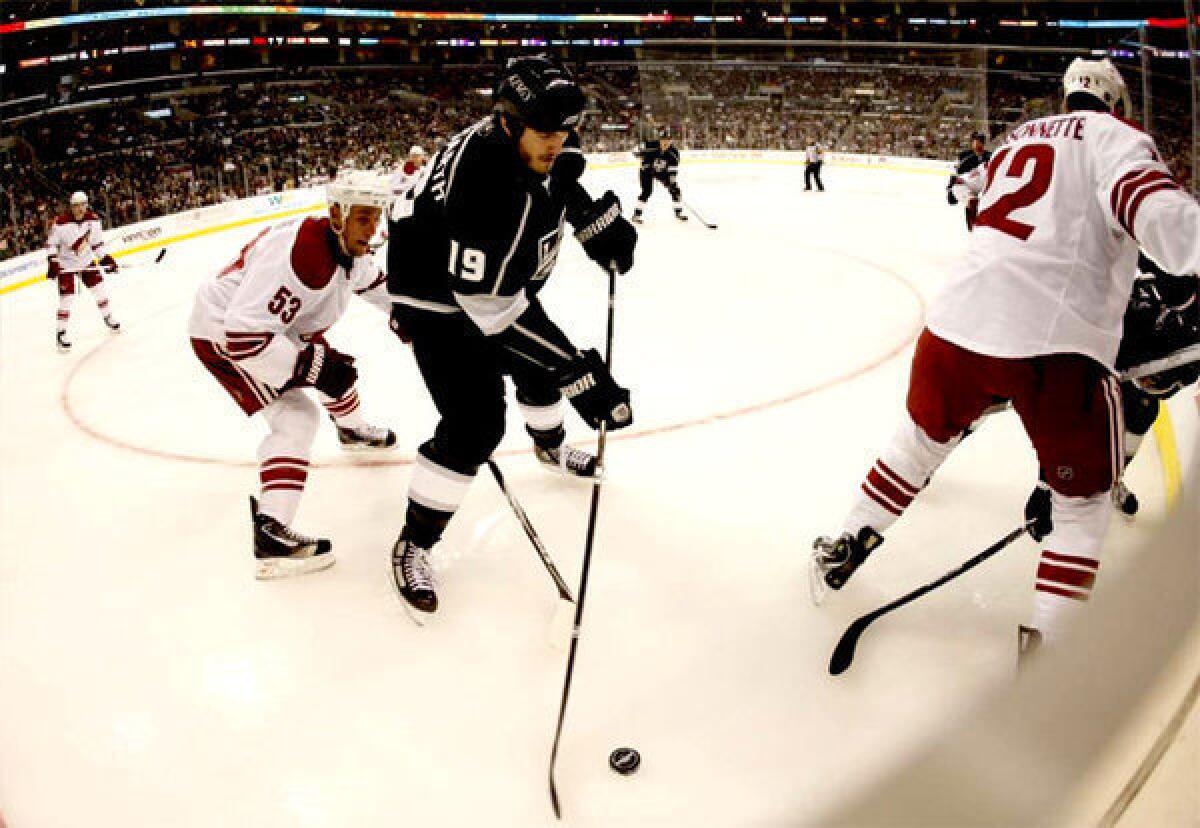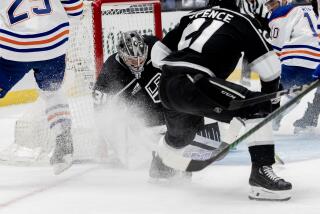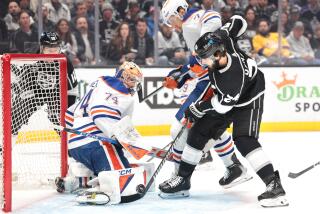Kings’ Kevin Westgarth rides emotional waves in NHL labor talks

- Share via
Kings enforcer Kevin Westgarth went through the same emotional extremes felt by everyone else who had an interest in the labor talks held last week in New York between the NHL and the players’ association.
But Westgarth was a member of the players’ delegation that met with owners and had a first-hand experience of all that went on, including the euphoria that blossomed on Tuesday when it seemed the sides were moving closer and the deflation on Thursday after the league broke off talks.
“I’m still riding the roller-coaster,” Westgarth said by phone on Saturday. “I let myself get very excited and then I was very disappointed. My wife [Meagan] is in same boat.
“It’s a lot easier to see what the reality is, being involved more. It’s pretty crazy.”
Westgarth, who has a degree in psychology from Princeton, saw owners attempt to use some psychology against the players during the talks.
At the invitation of NHL Commissioner Gary Bettman, players and owners had met Tuesday and Wednesday without Bettman and NHLPA Executive Director Donald Fehr, and those sessions resulted in movement on both sides. However, owners told players on Thursday that bringing Fehr back into the room would make it impossible to complete a new collective bargaining agreement, a notion players rejected.
“They said it would be a deal-breaker somehow to bring the PA leadership, and that halts the negotiations,” Westgarth said. “I don’t feel comfortable, and I don’t think 750 hockey players feel comfortable, with me making the deal when we have professional negotiators working for us.
“Maybe it was our fault and we shouldn’t have taken the meeting without our leadership. Basically, before, we were acquiescing to their unilateral condition that they didn’t want him in the room. I can’t imagine teachers, auto workers, newspaper writers, or anyone else making a deal without their leadership in the room.”
Westgarth, who played in a charity game Saturday night in Windsor, Canada, said he has been busy with phone calls to members of the union’s executive and negotiating committees and in keeping his Kings teammates up to date on the negotiations. One player texted him at mid-week to say he had heard there had been a settlement, Westgarth said, emphasizing the importance of accurately relaying information.
He also said he remains hopeful a new collective bargaining agreement can be reached, even though the NHL said it was looking for a yes-or-no reply to its last proposal and not the counter-offer that the union presented. The key remaining differences are these:
--The NHL wants a 10-year labor deal with a mutual opt-out clause after eight years, while the NHLPA has proposed an eight-year term with a six-year opt-out option for players.
--The NHL wants the maximum length of players’ contracts to be five years but will permit seven-year deals when teams re-sign their own free agents, while the NHLPA has proposed an eight-year maximum. The five-year cap, NHL Deputy Commissioner Bill Daly said, “is the hill we will die on.”
--The NHL, seeking to eliminate front-loaded contracts, proposed a maximum variance of 5% from year to year in the value of players’ contracts. The NHLPA proposed that in contracts of seven or eight years the lowest year must be at least 25% of the value of the highest year of the contract.
Bettman said on Thursday that the league had pulled its offer off the table -- including its increased “make-whole” payment, but that might have been a negotiating ploy. The sides also differ on buyouts (the league says no, the NHLPA says yes) and on limiting escrow (again, the league says no and the NHLPA says yes).
“Our proposal was reasonable,” Westgarth said. “We understand that they have important issues. We hope they understand that we have important issues and if we’re ever going to play hockey again there has to be negotiating and some compromise.”
He said limiting contracts to five years would raise the salary cap hits of star players and leave less room on the payroll for second-tier players.
“You look at the NBA and you can win a championship with three solid players. In hockey, the game and teams do not work that way. It takes 20 if not 24 players to win in our league,” he said.
“Looking forward I don’t know if their goal is to create a two-tier system where it would be easier to break the union again. I don’t know if that’s their long-term game plan but to me, that seems to be the direction they’re going.”
Daly told The Times via email on Saturday that the league and the union hadn’t conducted any negotiations since Thursday and hadn’t planned additional talks.
Fehr, who spoke at a meeting of the Canadian Auto Workers Council on Saturday in Toronto, maintained the sides had been close -- which the NHL vehemently disputed -- and said he hopes talks resume soon. “You can’t make agreements if you’re not talking about it,” he said.
He also said it’s up to the league to take the initiative now because “they’re the ones who called a halt to the process.”
ALSO:
Cowboys’ Josh Brent arrested after teammate dies in car crash
West Virginia mascot who kills bear told not to hunt with musket
Tom Brady, Gisele Bundchen announce birth of baby, Vivian Lake
More to Read
Go beyond the scoreboard
Get the latest on L.A.'s teams in the daily Sports Report newsletter.
You may occasionally receive promotional content from the Los Angeles Times.











